
Tweeting Fear: Affective Messaging and Anti-China Sentiments in Nikki Haley's Discourse
In this paper, I examine Nikki Haley's discourse, focusing on her use of affective messaging to shape public opinion on China, specifically within the context of her concerns about the social media platform TikTok. By delving into Haley's ideological language and narrative construction, this paper explores how she constructs narratives, highlighting perceived threats from China and TikTok, while also examining how the audience responds.
Haley’s Anti-China Stance
Nikki Haley, a prominent political figure and presidential candidate from the Republican Party in American politics, has gained recognition for her strong anti-China stance, considering Communist China as America’s number one enemy and "the by far greatest threat to American security and prosperity" (Chatelain, 2023). Haley's political career, especially during the US elections, is marked by a consistent emphasis on this viewpoint, resonating in her speeches, debates, interviews, and social media interactions. Haley promises that her top priority as president will be strengthening America’s economy and military to confront the Communist threat (Kredo, 2023). Her language accentuates the perceived dangers posed by the Chinese government, highlighting concerns related to national security, economic competition, human rights, trade relations, and espionage activities; trying to shape public opinion and policy discussions.
This broader anti-China discourse also extends to specific technological platforms, like TikTok. Haley's concerns about the app extend far beyond its entertainment value; she critically expresses her concerns that TikTok, with its Chinese origins, poses a severe threat to the safety and national security of every American. Through her discourse, Haley frames TikTok as a potential tool for extensive Chinese surveillance, emphasizing the risks it may pose for American citizens. To get a better understanding of Nikki Haley’s discourse on TikTok, it is important to recognize that many American politicians view China as their enemy; therefore making this stance hegemonic in the US. This belief is shared widely in mainstream American politics and affects how leaders talk and make decisions about China-related matters. Haley's opinion and concerts about TikTok are influenced by this general view and therefore fit into this bigger picture of how America sees China.
Methodology
To discuss this topic, I will conduct a critical discourse analysis on data published between July 2020 and March 2023. The data exists out of various tweets of Nikki Haley posted on platform X (formerly known as Twitter) that specifically mention TikTok and a call to action video that was posted together with her petition to ban TikTok. The statements she provides in the chosen data will help examine the language and ideology Haley uses in her political discourse. Additionally, I will be analyzing various uptakes on X and YouTube to review how Haley’s discourse is received by the audience. To understand how Nikki Haley uses affective messaging to shape public opinion, additional theoretical concepts will be applied. I will make use of the concept of “intertextuality”, which refers to the shaping of a text's meaning by another text. Texts are never entirely new. “We continuously use and re-use elements of discourse borrowed from earlier moments of usage” (Diggit Magazine, 2019). Intertextuality will therefore help me grasp the meaning-making in the language Haley uses and uncover the ideological dimensions of her anti-China discourse.
Moreover, the concepts of ideology and hegemony will be applied. The concept of ideology can be divided into two different categories. In the first category, we can find the familiar '-isms', sets of ideas held by individuals, such as socialism, liberalism, communism and similar ideologies (Diggit Magazine, 2023). However, within the second and more complex category, ideology can be understood as “any set of socially structured ideas guiding behavior and thought in any domain of life” (Diggit Magazine, 2023). Here, ideologies can be seen as invisible guides that affect both our thoughts and actions, shaping how we see the world and interact with it. To elaborate on this, Verschuren (2011) explains how ideology is associated with underlying patterns of meaning, frames of interpretation, worldviews, and everyday thinking. He suggests that ideology goes beyond thoughts and beliefs and is about how people interpret the world and express their ideas. It involves understanding not only what people think but also how and why they express those thoughts. This way, ideology also stands for how we think things are and should be. This is part of what makes ideologies powerful, because they often become deeply ingrained in a way that we become to perceive them as normal. In the context of anti-China sentiments or the anti-TikTok discourse, it is therefore important to recognize the influence of overarching ideologies, such as neoliberalism, conservatism, and nationalism. These ideologies shape how people interpret and express their thoughts about China and TikTok (Verschuren, 2011).
The concept of hegemony is often used to express this normalization of ideologies, because ideologies are not just abstract ideas; they influence our actions and behaviors in everyday life. These normalized and hegemonic beliefs, shape how we view the world and guide our actions. Antonio Gramsci refers to hegemony as consent, explaining how those in power influence our beliefs and actions by gaining our agreement. This process occurs without the usage of coercion or force, but may be influenced, at least partially, by the presence or potential threat of coercive institutions or force (Blommaert et al., 2003). We might not even realize we are acting based on these ideologies, therefore making them invisible, as they become naturalized in our minds. In essence, ideologies influence both our behavior and our perceptions of what is ordinary and what is not. Nikki Haley's consistent effort in constructing a hegemonic stance against China with her discourse is therefore an intriguing topic for analysis.
Lastly, I will draw upon Papacharissi’s (2015) concept of affective publics, which she describes as “networked publics that are mobilized and connected, identified, and potentially disconnected through expressions of sentiment”. It refers to the creation of online communities formed by people who share similar emotions or sentiments about specific topics, events, or issues on social media platforms.
Using the aforementioned theory I will be analyzing Nikki Haley’s discourse revolving around TikTok and China, in which this paper will ultimately attempt to answer the question: how does Nikki Haley use affective messaging to advocate her ideology against China and how it is received by her audience?
From Fear To Skepticism: Analyzing The Ideological Strands in Nikki Haley's Messaging
Nikki Haley has voiced her concerns about TikTok's connections to China for a considerable time and she uses her social media in doing so. In today's world, media plays a crucial role in shaping and sharing ideologies, serving as key platforms for the production, reproduction and consumption of ideology (Maly, 2023). So, in gaining a deeper understanding of Nikki Haley's discourse and its uptakes, I found that her Twitter account provided some valuable insights.
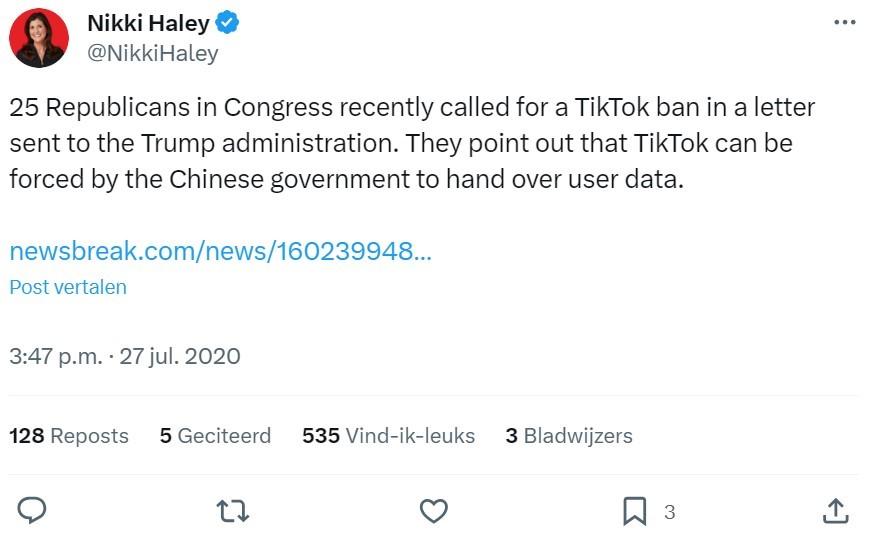
Figure 1: X post by Nikki Haley
Starting the analysis, I will take a look at one of Haley’s earliest tweets (figure 1), in which she ties TikTok to China, dating back to July 2020, serving as a pivotal moment to explore her concerns about the popular social media platform. The tweet reads: “25 Republicans in Congress recently called for a TikTok ban in a letter sent to the Trump administration. They point out that TikTok can be forced by the Chinese government to hand over user data."
In this tweet, Haley uses the power of intertextuality by referencing the letter from 25 Republicans in Congress. As described by Blommaert (2020) Intertextuality refers to the shaping of a text's meaning by another text and whenever we open our mouths, they are filled with the words of others. In this case, Haley's tweet is intertextual because it directly refers to the contents of the letter. This way, she is strategically building upon their words and concerns to convey her message about TikTok, highlighting the platform's vulnerability to Chinese government coercion. Thus, Haley draws on the authority and credibility of her colleagues' statements to support her message that user data may not be secure. This intertextual reference strengthens her message, aligning her discourse with the collective voice of the Republicans in Congress, additionally embedding her viewpoint within the broader hegemonic anti-China discourse present within American politics.
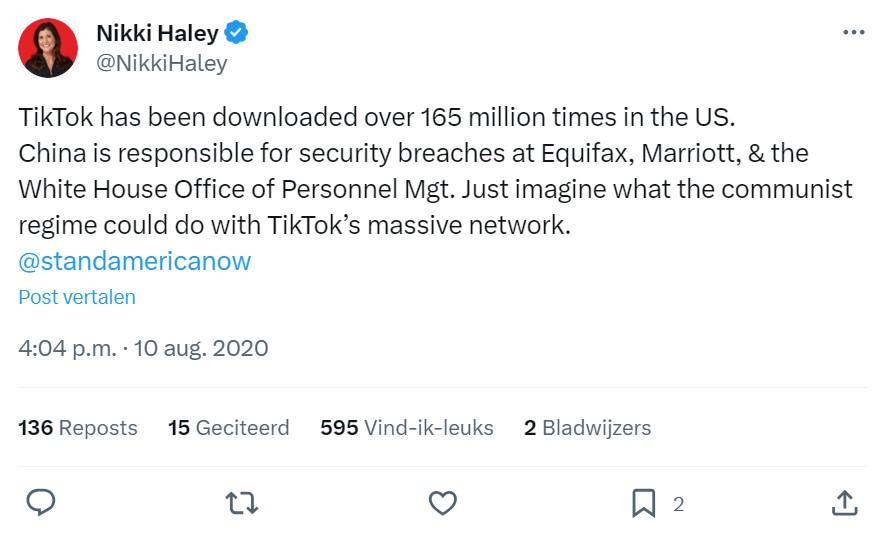
Figure 2: X post by Nikki Haley
Building upon the concerns raised by her Republican colleagues, Nikki Haley's subsequent tweet (figure 2) on August 10, 2020, delves deeper into the perceived threats associated with TikTok. By stating, "TikTok has been downloaded over 165 million times in the US," Haley emphasizes the popularity of the app, amplifying the scale of the issue at hand. Linking this popularity with China's alleged involvement in past security breaches at institutions like Equifax, Marriott, and the White House Office of Personnel Management, Haley intensifies a sense of urgency. With the intertextual reference to earlier security breaches, Haley tries to intensify fear, invoking a sense of potential catastrophe. By urging her audience to "imagine what the communist regime could do with TikTok's massive network," she aims to paint a vivid and alarming picture. Again, her tweet reflects a strong stance against China, playing into the broader anti-Chinese feelings in the US, driven by an 'anti-communism' ideology. It sets up a contrast between the 'free capitalist West' and 'communist China'.
As pointed out by Papacharissi (2015), online platforms, such as Twitter, serve as spaces for individuals to engage in emotional dialogue and collectively share their feelings about particular issues. The tweet has 595 likes and when analyzing the audience's uptakes, it is evident that strong emotions are present, although probably not in the way Haley intended.

Figure 3: Comments under an X post by Nikki Haley
This tweet is an example of how Nikki Haley attempts to shape public sentiment through her communication tactics. By employing emotional appeals, especially fear and concern, Haley actively participates in the formation of affective publics, which are social formations that emerge online through the exchange of emotional expressions through social media platforms (Papacharissi, 2015). The audience responses to this tweet are overwhelmingly negative, creating an unexpectedly affective public, characterized by dissent and opposition (figure 3). Contrary to Haley's message, people viciously disagree with her. The negative responses from the audience create a shared sentiment of disagreement and frustration, creating a collective emotional experience among people who oppose Haley's viewpoint. User comments such as "nothing worse than what Trump is doing to America" and "How about tweeting about what needs to happen to contain COVID-19?" highlight the public's opposition to Haley's perspective, backfiring her efforts to gain support for her stance against China. This also shows how some users use the opportunity to voice their concerns about different issues, thereby influencing the overall sentiment and dynamics of the conversation Haley is trying to evoke.
That being said, it is important to note that when considering broader engagement metrics, such as the 151 retweets and 592 likes, the tweet has garnered a substantial amount of positive interaction. While the comments predominantly express dissent, the number of retweets and likes indicates a more complex audience response, emphasizing that a portion of the audience supports or engages with Haley's message in a positive manner.
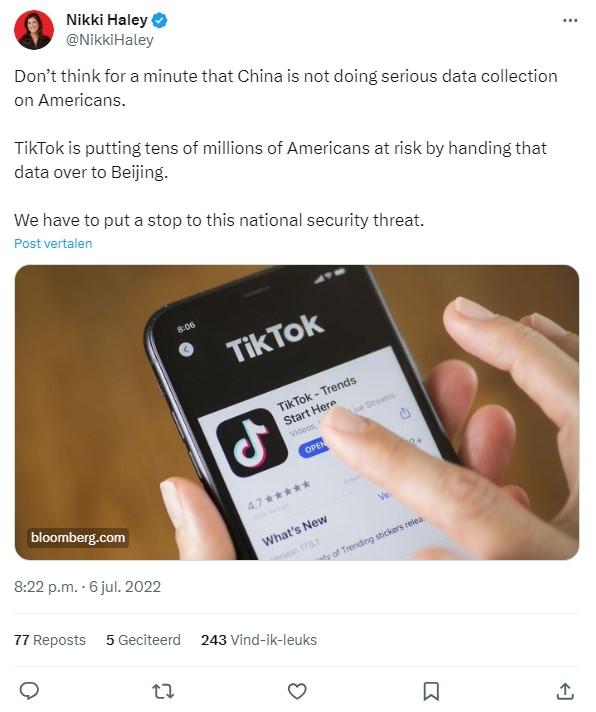
Figure 4: X post by Nikki Haley
Fast forward to July 2022, Nikki Haley frames TikTok as a pressing national security threat (figure 4). With this tweet, Haley positions herself as a proactive advocate for American security, urging immediate action against the alleged threat posed by TikTok, emphasizing the need to protect personal data from espionage by Chinese entities. By stating, "Don't think for a minute that China is not doing serious data collection on Americans”, Haley not only raises alarm but also challenges her audience's assumptions, forcing them to confront the potential vulnerability of their data. Her deliberate choice of words, "serious data collection," raises a sense of urgency, painting a striking picture of the extent of the threat.
Furthermore, by pointing out that "TikTok is putting tens of millions of Americans at risk by handing that data over to Beijing," Haley employs a metonym, using 'Beijing' to represent 'China.' This subtle linguistic choice invokes broader associations, linking the social media platform not just to the Chinese government but also to ideas of communism, dictatorship, and a perceived adversarial stance. In doing so, Haley strategically taps into existing sentiments and fears of espionage and loss of privacy by Chinese entities. Haley's call to action, "We have to put a stop to this national security threat," not only reinforces the urgency of the situation but also positions her as a vigilant advocate for American security. This emphasis on safeguarding national security aligns with the underlying ideological pattern of American nationalism that shapes the discourse against China. By framing the issue as a shared responsibility and emphasizing the need for immediate intervention, she urges her audience to join her in the fight against TikTok and China. Furthermore, by also including a link to a Bloomberg news article in which "TikTok confirms some China-based employees can access US user data", Haley is attempting to add credibility and legitimacy to her message.

Figure 5: uptakes on an X post by Nikki Haley
Haley's concerns resonated with a specific group of people, through which she is creating an affective public around her (figure 5). Some comments echoed her worries, creating a sense of unity among individuals who shared similar thoughts about China. While not everyone agreed, the presence of these supportive comments shows that there is a faction of the audience who aligns with Haley's anti-Chinese stance. This subsequent mix of supportive comments and dissent indicates a change in discourse. The shifting patterns of audience responses suggest that Haley, over time, has succeeded in normalizing the anti-China discourse among the networked public on her social media. The transformation from predominantly negative comments to a more diverse range of responses signifies a gradual acceptance or at least acknowledgment of Haley's narrative, showcasing the impact of consistent messaging in shaping public perceptions over time.
Haley's TikTok Resurgence
After a period of relative silence about TikTok, Nikki Haley resumed her focus on the platform after announcing her run for the 2024 presidential election in February 2023. Following her announcement, she resumed addressing TikTok on X in March 2023, coinciding with a congressional hearing where TikTok CEO Shou Chew had to appear to address concerns about the platform's ties to China. During this time, Haley used her X account to express her views on TikTok and its threats to American security.
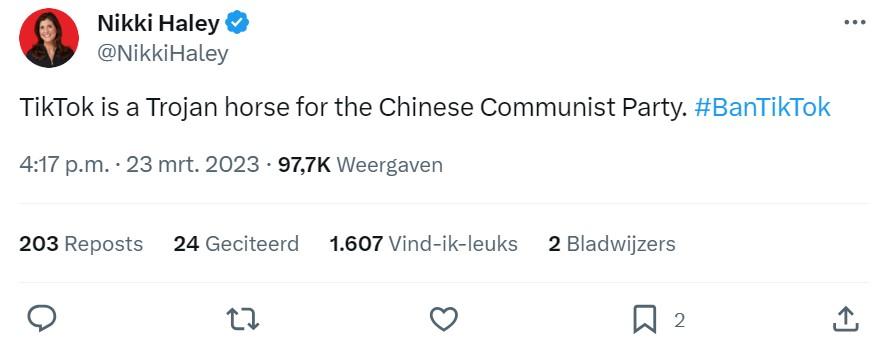
Figure 6: X post by Nikki Haley on the day of the TikTok hearing
On the day of the Congress hearing, Haley seized the opportunity by posting a provocative tweet comparing TikTok to a 'trojan horse', infiltrated by the Chinese communist party (figure 6). The metaphor of TikTok as a "trojan horse for the Chinese communist party", echoing a theme also used by presidential candidate Vivek Ramaswamy, illustrates the intertextuality within this tweet. With this metaphor Haley refers to the ancient Greek story of the Trojan Horse, where Greeks infiltrated the city of Troy by hiding inside a giant wooden horse presented as a gift. Once inside Troy's walls, hidden soldiers came out and attacked, leading to the fall of the city (Pickles, 2014). Thus, in this context, the tweet of Haley implies that TikTok, like the Trojan Horse, might seem harmless on the surface but conceals a hidden threat, symbolizing the infiltration of Chinese influence in American digital spaces.
Furthermore, the accompanying hashtag #bantiktok amplifies this message online, uniting people who share concerns about the platform's potential dangers. As pointed out by Papacharissi (2015) hashtags are more than just symbols; they are like open containers that can be filled with different meanings and ideas. People use hashtags to express their feelings and opinions collaboratively, in which they help form communities (affective publics) of people who share similar sentiments. They serve as framing devices that allow people to be rendered into publics; networked publics that want to tell their stories collaboratively and on their terms (Papacharissi, 2015). Nikki Haley engages with the affective public and contributes to shaping the discourse surrounding TikTok's alleged threats, in which #bantiktok becomes a symbol of defiance, intensifying the urgency of Haley's message and encouraging others to join her campaign against the platform.

Figure 7: X post by Nikki Haley about the petiton to Ban TikTok
Later that day, Haley posted a tweet (figure 7) in which she shared a petition advocating for the ban of TikTok. The accompanied text reads: "China is using TikTok to spy on you. Sign my petition to ban TikTok". The inclusion of a link to her petition adds a tangible dimension to her message, encouraging people to actively participate in her campaign against the platform. Through this tweet, Haley employs social media as a powerful tool to gain public support, emphasizing her commitment to addressing what she perceives as a significant national security threat. The petition also represents her ideology, demonstrating how ideologies influence actions and shape the way individuals interact with the world around them (Verschuren, 2011). It reflects how Haley’s ideological beliefs guide her actions. Haley's petition against TikTok is a tangible manifestation of these beliefs, reflecting her concerns about national security. Thus, this tweet reveals the connection between Haley’s ideology and her real-world actions in the digital sphere.

Figure 8: Nikki Haley's call to action petition video
Attached to the petition, Nikki Haley shared a promotional video, which is also shared on other platforms, such as YouTube to further amplify her stance against TikTok (figure 8). In the video, Haley directly addresses the audience, speaking into the camera to convey her message by saying: "How would you feel if someone was standing over you looking at everything on your phone? How would you feel if someone was paying attention to how you think, what you watch and what you do with your phone? How would you feel if you knew that was the Chinese military? That is TikTok. That's the dangers of TikTok. And not only that, they influence what you see and they try to change the way you are thinking about how you see the world. We need to ban TikTok once and for all. Get the Chinese military out of our way. Let's not help an enemy. Ban TikTok today”.
Hegemonic position of mainstream American politics
We can understand Haley’s communication in the context of a larger culture war to normalize an ideology (Maly, 2022). She presents various TikTok-related concerns, such as framing the platform as a national security threat, in a way that aligns with the larger anti-Chinese discourse, making American nationalism more acceptable and supporting American digital capitalism. The video message is strategically crafted to evoke strong emotions and instill a sense of urgency and concern among viewers. By tapping into the potential fears and anxieties related to privacy invasion and national security, Haley aims to generate specific emotional responses within the public, thereby constructing an affective public. Let’s just say that she has succeeded in that.

Figure 9: various uptakes from X users on the petition video of Nikki Haley
Examining the comments on Nikki Haley's video reveals a broad spectrum of emotional responses within the audience (figure 9). In the context of affective publics, this can be described as "disconnected", which refers to individuals within a group that have different emotional responses or opinions about a topic. In this context, the people who disagree with Haley’s stance against TikTok and China express their dissent and frustration. This diversity leads to varying sentiments within the network, which in this case reveals the formation of two distinct affective publics. One group shares fear and concern, aligning Haley's narrative and uniting against perceived threats. In this context, the notion that “ideology is layered, stratified, and has varying dimensions and scopes of operation, as well as varying degrees of accessibility to consciousness and agency” (Diggit Magazine, 2023, para.8) becomes evident in the analysis of comments.
Some individuals do not fully grasp the layered nature of the ideological load in Haley’s anti-Chinese discourse, leading to diverse responses. One example of this is a user comment that reads: “Just the same way Facebook does it? Yes I feel frightened and that’s why I deleted Facebook”. However, in contrast, there is another group that questions Haley's claims by showing skepticism and resistance. These reactions, ranging from fear and caution to skepticism and disagreement, highlight the diverse sentiments present among the audience. These diverse responses show us how digital platforms enable the formation of affective publics, where individuals with varying emotional stances participate in shaping the discourse surrounding TikTok's alleged threats.
An Ideological Contradiction
Having said all this, there is something that cannot be ignored. Because signing a petition during election time? Pretty interesting. Usually, this means “I am going to steal your data”, which also means that Nikki Haley is doing the exact same thing as TikTok.
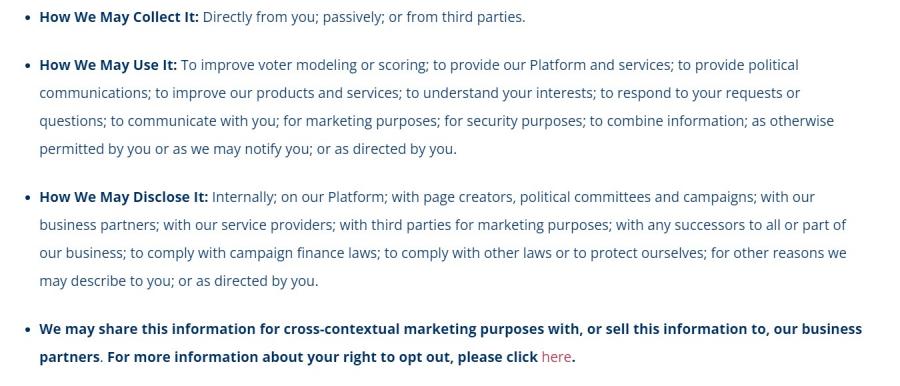
Figure 10: general privacy policy of Winred
Upon closer examination of the privacy statement associated with the petition (figure 10), it becomes inevitably clear that the petition serves as a data-collecting device, involving the sharing and selling of data to business partners, service providers, and third parties for marketing purposes. Clicking on the link included in the tweet prompts individuals to provide their name, number, and email, with the small print stating: “By providing your phone number, you are consenting to receive SMS/MMS news alerts, action items, and donation requests to the number from Nikki Haley directly or by third parties acting on her behalf” (Winred, 2023). This petition brings to light a contradiction in Haley's stance on data security. It underscores the discrepancy between her voiced concerns about data security and the utilization of comparable methods amid election campaigns. While expressing concerns about data practices carried out by China, Haley's petition involves a form of datafication for political purposes. This discrepancy suggests that not all datafication and surveillance are treated equally in her ideological framework; it is perceived as a concern when done by China but seemingly acceptable when utilized for her political objectives. Thus, the petition contributes to her advocating her ideology, also functioning as part of an ideological apparatus (Maly, 2023).
One of the responses by X user @ChrisPartlow1 to Haley’s post also reads: “Really…isn’t this a form of “data collection” on your part? Ban Nikki Haley seems only fair then”. Another user also replied quite amazed to the petition, in which she wrote that she received a link to a petition concerning TikTok, which turned out not to be connected to any petition at all (figure 11).

Figure 11: uptake from YouTube user on the petition of Nikki Haley
This contradiction underscores the disparity between her voiced concerns about data security and the utilization of comparable methods during election campaigns. Quite ideological indeed.
So, Affective Or Not?
What does all of this tell us? In analyzing Nikki Haley's discourse on TikTok and China, it becomes clear that her strategic use of affective messaging to advocate her anti-China ideology plays an important role in shaping public perceptions. Through fear, urgency, and concern, Haley creates a narrative around TikTok, evoking emotions related to privacy invasion and espionage. She critiques TikTok, emphasizing their alleged ties to the Chinese government, fostering fear regarding Chinese influence and control. Furthermore, Haley links her anti-Chinese rhetoric to national security concerns, warning people about the challenges posed by China and framing her stance as a defense of American interests and safety.
However, the diverse responses she receives highlight the complex nature of public sentiment, pointing out that affective publics are not homogeneous entities. While some individuals align with Haley's discourse, forming supportive communities that echo her concerns, there is a significant group of people that responds with skepticism and opposition. This shows us that affective messaging is not a one-size-fits-all strategy. In the case of Haley, it can rather be seen as a double-edged sword, capable of evoking both support and skepticism.
That being said, the power of affective messaging is not solely determined by positive responses; negative reactions can be just as impactful. Nikki Haley's approach to discussing TikTok and China exemplifies this complexity. While her approach exists out of a wide spectrum of reactions, from strong support to vehement opposition, Haley's discourse undeniably triggers reactions. And it is in these responses, both positive and negative, that the power of affective messaging becomes apparent. Even the criticism she faces puts her into the public eye, solidifying the hegemonic anti-Chinese stance. Haley's ability to evoke intense emotions, even in disagreement, signifies the profound influence of affective messaging. In essence, the responses she generates, whether positive or negative, underscore the power of her communication strategy. It emphasizes that the impact of affective messaging goes beyond mere positivity or negativity, illustrating its profound reach and influence.
References
Chatelain, R. (2023, June 27). Attacking both Biden and Trump, Haley lays out her strategy for China. Spectrum News NY1.
Diggit Magazine. (2023, March 21). Ideology.
Intertextuality. (2019, March 21). Diggit Magazine.
Jan Blommaert. (2020, June 16). Jan Blommaert on intertextuality [Video]. YouTube.
Kredo, A. (2023, June 27). Haley talks tough on Beijing in major foreign policy speech. Washington Free Beacon.
Maly, I. (2022, December 7). From methodology to method and back. Some notes on digital discourse analysis. Diggit Magazine.
Maly, I. (2023, September 18). Digital economy and platform ideologies. Diggit Magazine.
Pickles, M. (2014, July 25). Did the Trojan Horse exist? Classicist tests Greek “myths” |. University of Oxford.